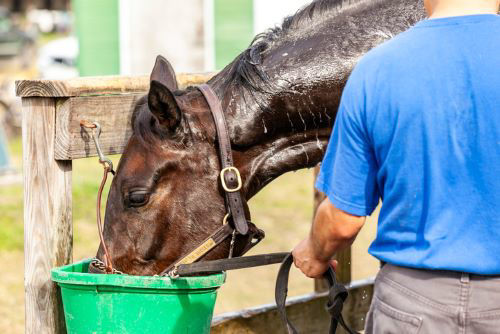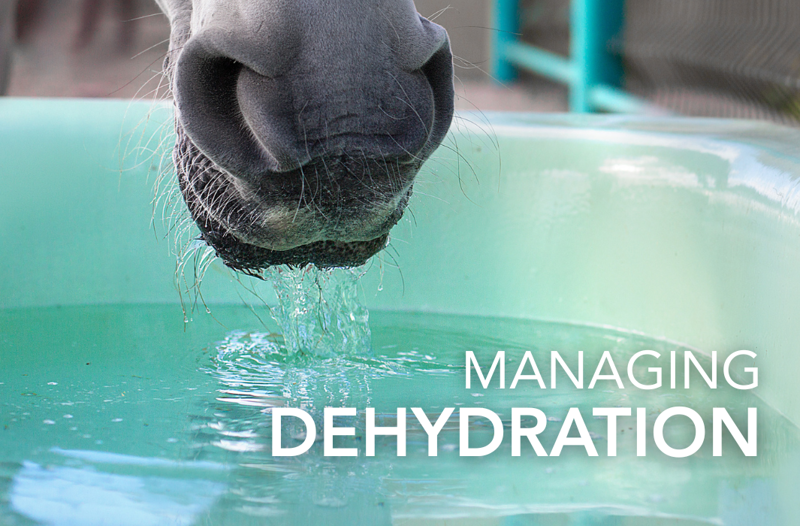Written by registered Nutritionist Stephanie Hyland MSc (RNutr.)
Why it's important to keep your horse hydrated:
Water is a vital nutrient and is needed to form blood, urine, perspiration and much more and is critical to every aspect of life.
Horses normally consume 20-55 litres of water in a 24-hour period, and diet has a direct impact on how much water a horse consumes. Fibre helps to trap water and electrolytes in the hindgut and provides a reservoir that the horse can draw on to help them combat dehydration, particularly during exercise periods. Grass contains 60-80% water so for horses with free access to grazing a large proportion of their water intake will come from what they are eating. Hay can be as low as 15-20% water so it is likely that you will notice your horse drinking less water when turned out on fresh grazing, compared to when they are fed a mostly hay based diet.
Alongside diet, weather and exercise can affect water consumption. Horses working hard in hot temperatures can have increased water requirements up to 300% so it is important to ensure that your horse remains well hydrated, particularly when the temperatures start to increase. Within 48 hours without water, horses will be showing signs of colic and impactions can quickly develop.

Exercise significantly increases horses water requirements
To help regulate their temperature horses sweat, and evaporation of sweat from the skins surface is responsible for up to 70% of heat loss during exercise. Horses typically lose 5 – 15 litres of sweat per hour of exercise depending on the intensity. Due to their sweat being hypertonic, they lose more electrolytes than water when sweating. Therefore, it is important to replenish these electrolyte losses otherwise horses will quickly become dehydrated, and this can affect performance and lead to electrolyte imbalances.
Signs of dehydration in horses include:
· Decreased thirst response
· Loss of skin elasticity (Gently pinch a fold of skin, typically on the neck, and observe how quickly it returns to its original position. If it takes more than a few seconds, your horse could be dehydrated).
· Dry mucous membranes
· Dark coloured urine
What are electrolytes and why are they important to the horse?
Electrolytes are minerals that are found within the body which maintain fluid balance by controlling the movements in and out of cells. The positive (cation) and negative (anion) charges of electrolytes within extracellular and intracellular fluid create and osmotic gradient in which electrolytes move across the cell membrane until an equilibrium is established. Electrolytes play an important role in the horses’ well-being and are required for normal bodily functions such as controlling blood pressure, cardiovascular stability and correct nerve and muscle function.
The key electrolytes are Sodium, Chloride, Potassium, Calcium and Magnesium and each supports a specific function of the body, some of the functions are:
· Sodium – Principal cation in the extracellular fluid
Aid absorption of key nutrients
Helps control gastric pH
· Chloride – Principal anion in the extracellular fluid
Used on CO2 removal
Activation of enzymes
· Potassium - Principal cation in the intracellular fluid
Hormone release
Energy transfer
Protein synthesis and carbohydrate metabolism
· Calcium – Bone formation
Muscle and nerve function
Cell wall structure
· Magnesium – Neuromuscular activity
Cell respiration
Enzyme activation
Carbohydrate, protein and fat metabolism

Horses typically consume 20-55 litres of water in a 24-hour period
It is important to feed electrolytes when your horse has been sweating to ensure that their electrolyte balance is maintained as their normal diet cannot provide enough electrolytes to replenish what they have lost through sweating.
Did you know? When horses drink water, this dilutes the electrolyte levels in their bloodstream. In turn this can ‘switch off’ the thirst response and lead to further dehydration.
Dehydration can be prevented by:
· Providing plenty of clean, fresh water and always allowing your horse access to water
· Adding electrolytes to their feed
· Feed plenty of forage
· Cool your horse off after exercise
· Provide your horse with shade
Feed and forage do not supply enough electrolytes for horses in work so supplementing their diet will help to ensure correct electrolyte balance and reduce the risk of dehydration during hotter weather. Horses have an indisputable appetite for salt and generally take it well, however, there will be some horses that need to be trained to take electrolytes whether that is in their feed or in water. If your horse is fussy with electrolytes, generally adding it to feed can help.
It is important to remember that if you are offering your horse electrolytes in their water, fresh un-supplemented water should also be provided at the same time to help your horse stay hydrated. If your horse will only take electrolytes in water, make sure that they are offered fresh water after exercise before you offer electrolytes in water otherwise this could lead to further dehydration.
For any advice or questions you may have, please don't hesitate to reach out to our expert nutrition team. You can call 0800 585525 Monday-Friday 8:30am-5:00pm. Email [email protected], or send us a DM on social media.



